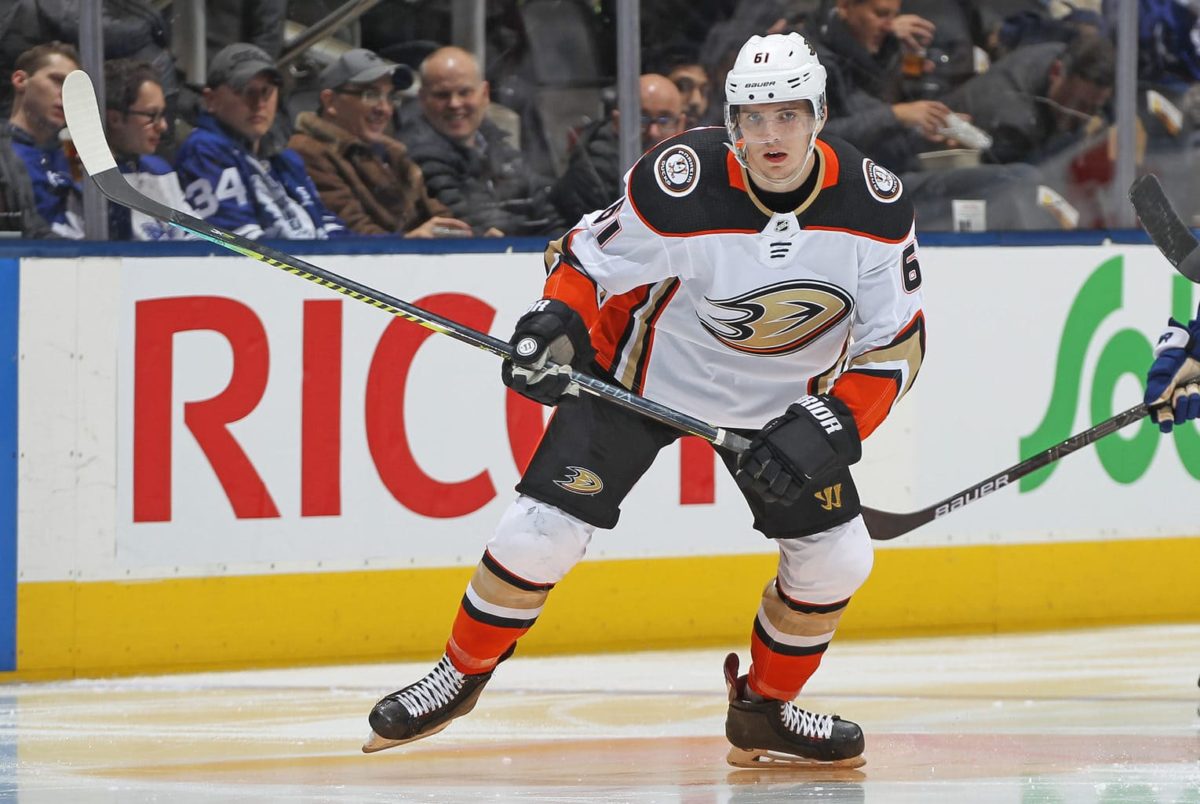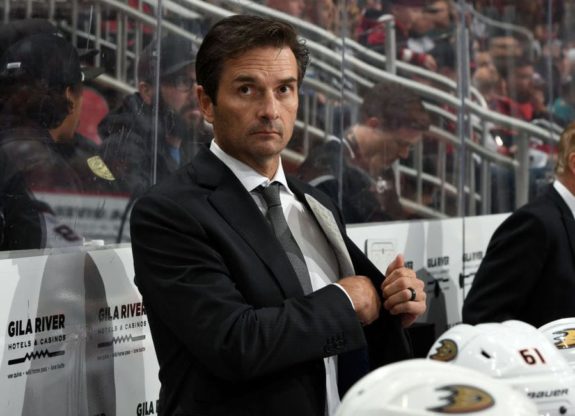The Anaheim Ducks took the San Jose Sharks to a shootout on back-to-back nights in Anaheim, losing Game 1 and winning Game 2 on Friday and Saturday, respectively. They took three out of a possible four points in the series against a rival and fellow competitor for that last playoff spot in the West Division. The Ducks’ young players played a vital role in the series that saw them drastically increase their shot output yet fail to score a power-play goal.
Youngsters Were a Bright Spot in the Series
The younger forwards the Ducks are relying upon to add offense have scored on an inconsistent basis this season. That changed against the Sharks.
Max Comtois, Isac Lundestrom and Troy Terry pushed the Ducks to earn a point in Game 1 and win Game 2.
Comtois scored twice in Game 1, including a late, game-tying goal before the Ducks lost in a shootout.
Comtois showed what makes him a threat in the offensive zone. Although his game isn’t fancy, he knows how to lose opponents when the Ducks are cycling the puck and get open in front of the net. Both goals came from nearly the same spot on the ice and resulted from the same tactic by the young winger. Comtois swung wide in the offensive zone, preceding both goals while his teammates possessed the puck on the opposite side. When he saw his opponents had lost track of him, he stopped just to the side of the net for both one-time goals.
Comtois wasn’t the only young Duck to find the scoresheet against the Sharks.
Scary Terry and Lucky Lundestrom
Terry scored his first goal of the season in Game 1 on a laser shot from that beat Martin Jones over his left shoulder.
Increasing his shot attempts is something Terry’s head coach, Dallas Eakins, has encouraged him to do for multiple seasons, and it paid off for him in this situation.
Terry was one of the series’ best players. In Game 2, he didn’t hesitate to advance the puck on his own, showcasing his speed and stickhandling ability on rushes deep into the offensive zone. That included a rush in overtime that Terry ended in a perfect pass to Rickard Rakell, who failed to score.
Comtois and Terry, who is no stranger to shootout success, scored in the shootout in Game 2 to seal the victory.

Lundestrom also added his first NHL goal, albeit an odd one, when he deflected a Hampus Lindholm shot past Sharks goalie Devan Dubnyk.
Though Lundestrom’s deflection may have been accidental, a happy side effect of his attempted dodge of Lindholm’s shot, he was posted in front of Dubnyk. Forcing traffic in front of opposing goaltenders is something the Ducks have struggled with, and Lundestrom benefitted from being in the right place.
Eakins also showed his confidence in the play of Lundestrom and Comtois at the end of Game 2 when he had them both out in an attempt to break the 1-1 tie and avoid overtime.
Increasing Shots
During the broadcast, Ducks play-by-play commentator John Ahlers pointed out Eakins’ effort to encourage his players to shoot more and not pass up opportunities in “the fairway.” That point seemed to come across in the past week.
The Ducks notched 43 shots versus the Kings, 37 in Game 1 versus the Sharks and 33 shots in Game 2.
The Ducks rank No. 28 in the league in shots per game so far this season. It’s a problem deeply ingrained in them. The Ducks haven’t ranked better than No. 23 in the league in shots per game since 2015-16 when they finished at No. 12.

Their two-game total (including two overtimes) of 70 Is the most they’ve attempted in any series this season. The offensive results improved in Game 1, resulting in four regulation goals. Though the Ducks only scored a single goal in Game 2, the story may have been different had Martin Jones been in the Shark net for both games rather than Dubnyk in the back end of the series.
Power Play Problems Persist
Unfortunately, many of those shots came on the power play, which failed to produce a single goal yet again. It’s blatantly obvious that even when the team is generating opportunities, they don’t have a player who can beat a goaltender cleanly on the power play.
The Ducks need an upgrade on their power play, and the best candidate for that is Trevor Zegras, who has two goals and three assists in just two games for the San Diego Gulls. The Ducks need a player who’s a threat to shoot or thread a precision pass on the power play. That draws increased attention from penalty killers, opening up more chances for teammates. Now it’s just up to general manager Bob Murray to pull the trigger and promote Zegras to the NHL.
The Ducks enjoy two days off before traveling to Las Vegas to battle the Golden Knights. The two teams met to open the season, and Vegas took both games, one in overtime. The Ducks struggled with slow starts in that series as they did against the Sharks. Look for the Ducks to get off to a fast start and continue to shoot from all over the offensive zone.
all stats from hockey-reference.com and nhl.com